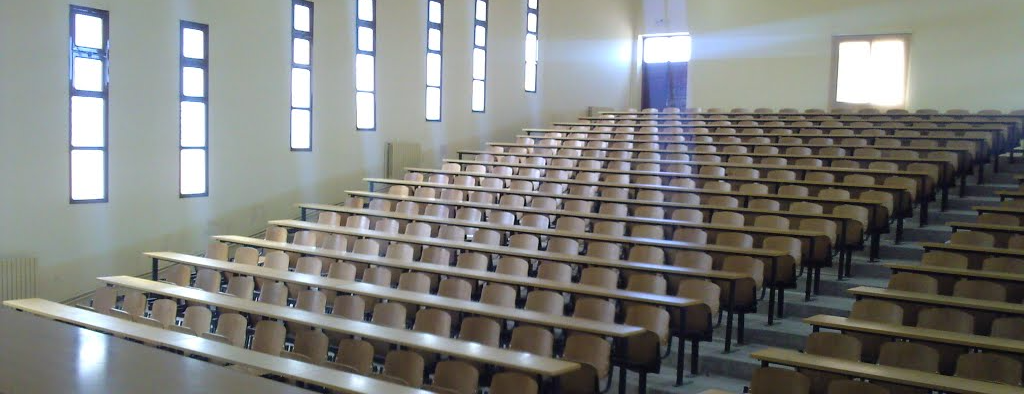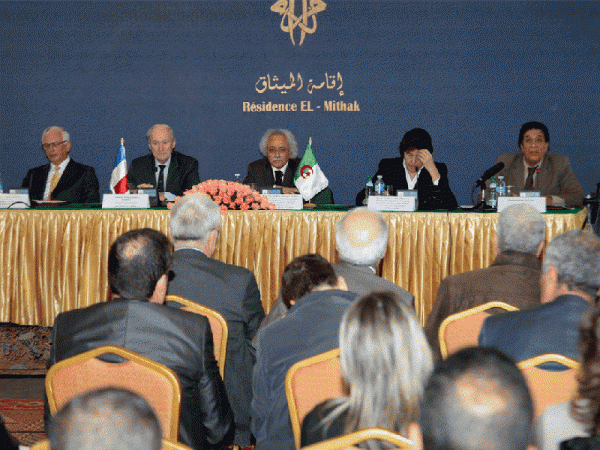Despotism of things… Here have a laptop!
The Algerian newspaper elkhabar published a news item last Tuesday and titled it: إجراءات تحفيزية لمنع ”هجرة الأدمغة” نحو الجامعات الأوروبية والأمريكية, which roughly translates to “incentive measures to prevent the “brain drain” towards European and American universities“. Great, I thought, that is going to be fantastic news, I’ll read on… And I did, only to instantly reach the subtitle: حاسوب نقال مزود بالأنترنت لكل مسجل في الدكتوراه بداية من الدخول الجامعي, which roughly translated to “a laptop computer with internet access for each doctoral students from the beggining of the new academic year“… And oh the disappointment.
 Where does one start when reading such a piece of news in the arguably most popular newspaper in the country. At the cynicism embedded in the emphasis placed on the fact that the computers will have internet access? A mind numbing thought in times where online interaction is a skill mastered by children and a handy tool for those endeavouring to stand up against their corrupt systems. Or perhaps start at the absurd insinuation that the troubles and concerns of young Algerian researchers can be reduced to and sorted out by the provision of a laptop computer?
Where does one start when reading such a piece of news in the arguably most popular newspaper in the country. At the cynicism embedded in the emphasis placed on the fact that the computers will have internet access? A mind numbing thought in times where online interaction is a skill mastered by children and a handy tool for those endeavouring to stand up against their corrupt systems. Or perhaps start at the absurd insinuation that the troubles and concerns of young Algerian researchers can be reduced to and sorted out by the provision of a laptop computer?
The latter point is far more interesting, not least because it attests to Malek Bennabi‘s thesis that civil deterioration of a muslim society can manifest itself as a disbalance in the “idée-chose” equilibrium. According to Bennabi, a despotism of “la chose” can take over the cultural sphere of that society, here exemplified by the views of elkhabar’s editors. Civil values that would contribute to advance the development of individuals and their society suffer from such despotism of “things” as they become increasingly shaped by such a shift in balance, where success and advancement are measured in terms of how much things we possess. Bennabi writes in his book “Le problème des idées dans le monde musulman” :
[..] quand l’univers culturel est centré sur les choses, la chose est au sommet de l’échelle des valeurs. Les jugements qualitatifs deviennent subrepticement des jugements quantitatifs sans meme que leur auteurs se doutent du glissement dans le choséisme: l’evaluation de tout a l’échelle des choses. (p90)
The role and power of “ideas” in such equation are marginalised. Ideas become figurative decor rather than functional forces that drive the society. Bennabi links this phenomenon to a phase in the life of a civilisation where it fails to efficiently utilise the means it possesses or address the problems it faces with a rigour that drives the minds of its masses to claim their place in history, he writes:
Une société sous-développée n’est pas fatalement marquée par une pénuries de moyens matériels (les choses), mais par une carence d’idées qui se manifeste notamment dans sa façon d’utiliser, plus au moins efficacement, les moyens dont elle dispose déja, dans son incapacité a en créer de nouveaux. Et surtout dans sa façon de poser ses problemes ou de ne pas les poser du tout quand elle abandonnes toute velléité de les aborder. (p52)
This approach to evaluating and addressing issues is actually no stranger to the way our governing system have been running things in our beloved Algeria. We Algerians refer to it as سياسة الترقيع, “the patching policy”, a political – and social – plague that, often favouring things over ideas, has been infecting all aspects of our society. The Algerian goverment has in fact made a name in this approach to political and social reform. Patch, patch, patch, patch. We saw it clearly in its response to the January 2011 riots (for which taxes and duties on basic food supplies were temporary cut down), and we are seeing it again in its reponse to the countless protests, sit-ins, strikes, etc. that followed since, where “increase their salaries!” has been the number one government strategy to contain crisis.
On a side note, providing doctoral students with laptops is a good thing. I’m not saying the contrary. This is a good move by the Ministry of Higher Education and Scientific Research (MESRS). The problem does not lie in the provision of laptops per se, but rather in the reduction of people’s concerns to an object gain, and then in the pretend that this would address crucial and deeper problems, such as that of brain drain, social injustice, corruption, appalling education system, etc., etc.
Incidently, I was amongst the audience at the recent ACA 2011 Summer University when the head of the DGRSDT, Prof. Aourag, made this announcement at the opening ceremony of the event. The 250 or so doctoral students present cheered loudly to the wonderful news..
Ironically, Prof. Aourag made another announcement too; that of a recent investment by the MESRS into a 5 years subscriptions to up to 32000 online scientific journals. The students cheered too, though this time it was a slightly less loud and less lengthy cheer, one must sadly admit..
A subtle but a clear difference in the auditory percept produced from reactions to the two announcements. The former was worthy of sending huge reverberations of whispers and hisses across the huge hall reflecting students awe! Again, should one blame the students who have been engulfed in an environment that glorifies things over ideas?
Nonetheless, elkhabar’s editors seem to have found the latter announcement less important to include in their news article. Or perhaps they consciously or unconsciously predicted that the “laptop-per-student” project is more likely to effectively be concretised on the ground than that of the journals subscriptions? Only time will tell, I certainly hope that it is not going to be the case. Then again, elkhabar is at the service of who, and who are they targeting really? The young researcher who is desperately seeking to leave the country for better academic prospects in EU or US universities, or rather the popular mind for whom this might just be another text beautifying the achievements of a caring government?
What is clear is that we are indeed living in a time where “la chose” dominates our perception of values and our criteria for awe. Where we measure how successfull we are by means of how much material we own – regardless of how mundane or useless this material is – and where we are happy propagating materialistic news with cheers and glory to further hypnotise ourselves into believing that reforms are not that patchy after all… The bottom line is this: the reforms we need, in higher education and research sectors and elsewhere, go way beyond the provision of things, and the time for our political actors to start showing us that they are capable of prioritising and seriously addressing our concerns is way overdue.





